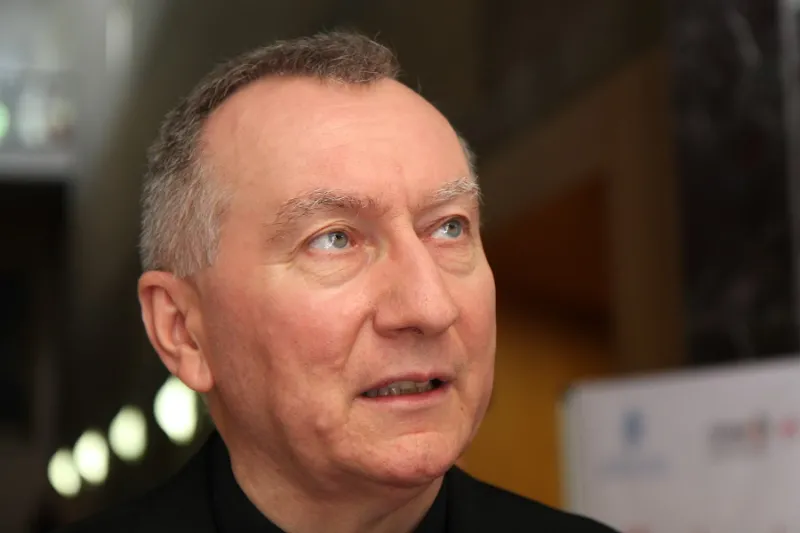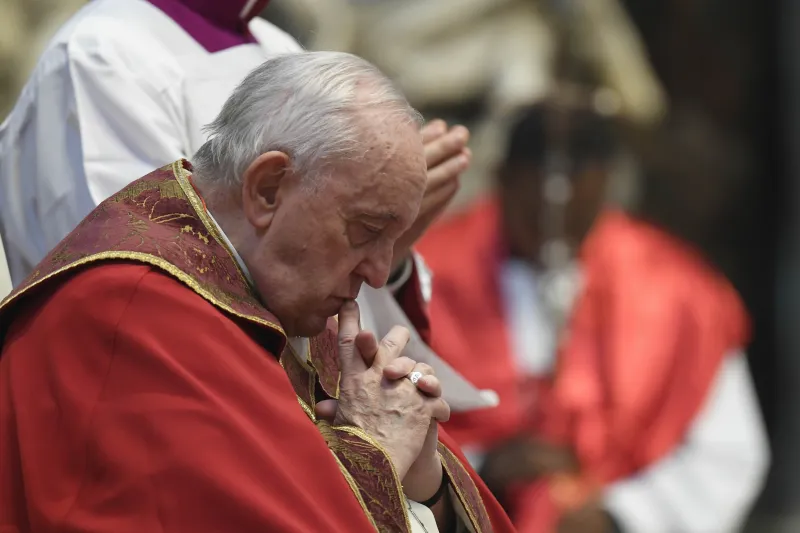
Vatican City, Apr 8, 2022 / 04:10 am (CNA).
The publication of the new Vatican constitution is not necessarily the end of curial reform and new offices could be added later, the Vatican Secretary of State has said.
In a recent exclusive interview with CNA, Cardinal Pietro Parolin spoke about the reform of the Roman Curia and the role of the Secretariat of State after the release of Praedicate evangelium.
He also discussed the Holy See’s current lack of diplomatic personnel. (In Part 1 of the hourlong interview, he addressed the Vatican’s efforts to end the Ukraine war.)
In 2014, Parolin talked about the possibility of creating an office for pontifical mediations within the Vatican Secretariat of State. The office would have had the task of overseeing the Holy See’s conflict mediation efforts.
The Holy See has proposed to act as a mediator between Russia and Ukraine. It has also sought to mediate in Venezuela, supported the peace process in Colombia, and served as a mediator in discussions between Cuba and the United States to restore diplomatic ties.
But this mediation activity did not lead to the creation of a specific office, as requested by Parolin.
For the Vatican Secretary of State, however, “it is not certain that the reform of the Curia will put an end to the idea of an office for pontifical mediations. The Curia is a living organism. It goes on, obviously always following the indications given by the pope. But how many institutes and entities have always been added after each reform?”
The head of Vatican diplomacy underlined that the “fundamental problem” is resources.
“There is a need for human resources and economic resources,” he said. “Such an office involved a massive investment because mediation is not just about making gestures; it is a fierce commitment to study. And it takes time, availability, means.”
The office was not created, above all, “because of this difficulty in finding resources. After all, we are a small reality facing enormous problems, and we try to do so with the forces we have at our disposal,” the 67-year-old Italian cardinal said.
As a member of the pope’s Council of Cardinal Advisers, Parolin helped to shape the new Vatican constitution, which describes the Secretariat of State as the “Papal Secretariat.” The Secretariat of State is now divided into three sections. There is an undersecretary for relations with states dedicated only to the multilateral sector and the Secretariat has lost its financial autonomy.
What, then, is the future of the Secretariat of State?
“As far as I understand,” Parolin said, “Paul VI had solved the coordination problem in a top-down manner, establishing that everything passed through the Secretariat of State. Today, this is no longer the point of view.”
“Certainly, the Secretariat of State is seeing some of its powers diminished, but it will continue to carry out its task of direct aid to the pope in the exercise of the Petrine ministry. After all, the Secretariat of State depends directly on the pope.”
Among the various crises to be addressed, there is a lack of Vatican diplomatic staff. There are currently 14 vacant nunciatures worldwide, some of which are particularly important, such as Venezuela, the European Union, and Jordan.
“The crisis is more general,” Parolin said. “It is a crisis that concerns priestly and religious vocations, a pool from which the personnel for the diplomacy of the Holy See was also drawn. At this level, it can be seen that every year it is challenging to find new candidates for the Ecclesiastical Academy [the institution that trains priests to serve in the diplomatic corps].”
In any case, for Parolin, the diplomacy of the Holy See “has the meaning of the search for peace, beyond particular interests.”
“There are no economic interests,” he explained. “There are no military interests, and there are no political interests.”
He added that the Holy See tried “to be present based on the Gospel and the tradition of the Church, because the Holy See has been present in the international community practically from the beginning.”
“We try to be present in situations of suffering, and we try to help resolve this suffering linked to conflicts, oppositions, or clashes of any kind,” he said.
Editor’s note: This is Part 2 of CNA’s interview with Cardinal Parolin.
If you value the news and views Catholic World Report provides, please consider donating to support our efforts. Your contribution will help us continue to make CWR available to all readers worldwide for free, without a subscription. Thank you for your generosity!
Click here for more information on donating to CWR. Click here to sign up for our newsletter.






Cardinal Parolin proposes a Vatican mediation office, but also laments correctly that do be done right “[t]here is a need for human resources and economic resources.” We are reminded of 1870 when the Church’s worldly bank account was reduced to the 109 acres of the Vatican, and when the wolves were quite sure that the Church was simply done.
But, we are also reminded of Pope St. John Paul II and his role in taking down the Soviet Union–a version of mediation truly healing to what George Weigel termed the “web of mendacity”), and, as a “human resource” (!), John Paul’s personal and very economical and evangelizing visits to 129 countries.
In at least one of his many works as a lay historian, Philip Jenkins speculates a seemingly anachronistic mediation role in our post-modern world cast adrift. So, what would it take for the Vatican to serve as a respected mediation office–very much needed in today’s fractious world?
In addition to “human and economic resources” (to get the research right), surely a foundational role for restored moral authority? And, affirmation of the coherence of Faith and Reason (Fides et Ratio, 1998)–of greater than academic interest in our cancel-culture world of systemic amnesia. Where mediating/reasoned discourse is preempted by identity politics, and where even within the Church, the most elementary human and personal sexual morality is publicly dragged through the streets by Cardinals Marx and Hollerich?
What is the difference between accommodation and abdication? Instead, and at all levels, no peace without justice, and no justice without truth.
So, mediation by someone other than the internally compromised United Nations, a very good idea whose time has come. But with ecclesiastical prerequisites. In addition to reallocated (?) “resources,” the ongoing reform of the curia must include a more proper place for the demoted dicastery for the Doctrine of the Faith. And, restored institutional heft weightier than any useful, but German-contaminated compilation of block-party synodal bullet points.
There is no “reform” happeing.
“Deforming” is what’s happening.
If “reform” were truly about “re-forming,” then the form we would see now in 2022 would be that the Congregation for the Faith would be restored to its pre-1970 status, as the most important Congregation in the Church organizaton. That is because one would logically expect that for a faithful Church, the most important office for such Church would be the office that guards and pronounces its faith. And that’s the way our Church was organized, for centuries, until 1970.
Then in 1970, Pope Paul VI “re-organized” the Vatican, and demoted “the faith” to 2nd place, and promoted “The Secretariat of State” as the most important office in Rome.
Let that sink in for a moment: 52 years ago, the Church demoted “the faith” to 2nd place, and promoted “world affairs” to 1st place.
And guess which office had final control over all sex abuse investigations, or rather “non-investigations,” for some 40-odd years after the 1970 “re-organization”?
Yes…you guessed right…the Secretariat of State…which fostered the silencing of sex abuse investigations for those decades.
And guess also which Vatican Office took charge of the “irregular process” used in the JP2 pontificate to elevate Theodore McCarrick to Cardinal?
Yes…you guessed right again…the Secretariat of State.
It’s a “de-form.”
It’s no reform, and never will be…while these characters…like Eminence Parolin…are running things.
Although Paul VI placed the Secretariat of State as executive for all dicasteries including the CDF, the CDF retained its proper authority in its original Trent post Reformation role as sentinel for orthodox interpretation of the faith. Pope Francis from the start of his pontificate diminished that premier dicastery [removing CDF prefect Cardinal Gerhard Muller’s most effective priest assistants without offer of reason] apparently in lieu of his new paradigmatic pastoral approach.
The recent elevation of Propaganda Fide as the primary dicastery and appointment 2019 of Cardinal Luis Antonio Tagle as its prefect remains the essential reform of the Curia a clear indication of the direction away from permanent doctrine to a flexible application of ‘rules’. Whether this benefits the Church is the question. To date this approach has not shown widespread positive results.